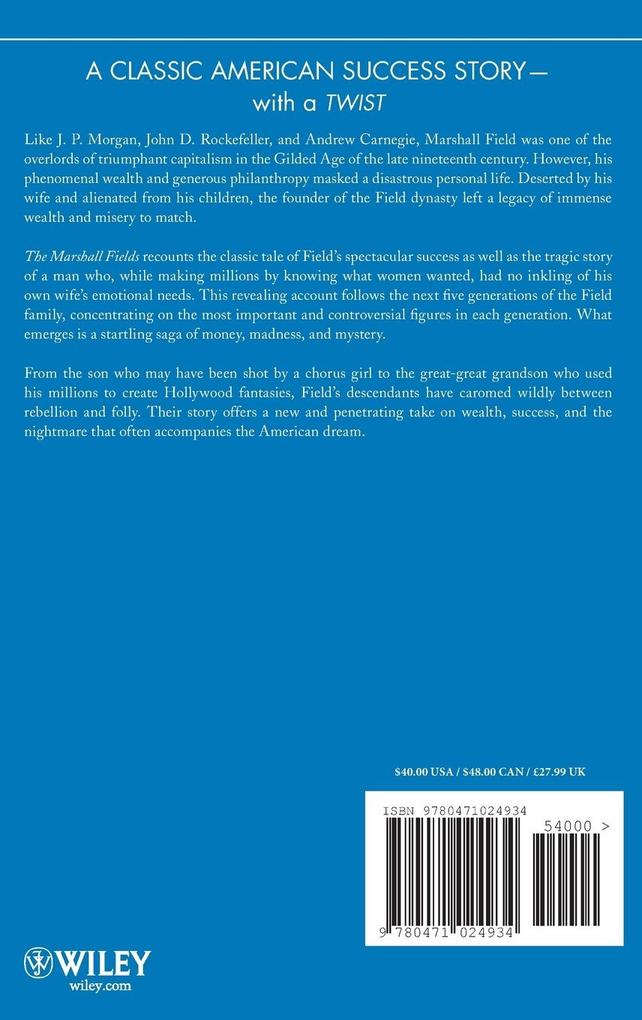Unless you knew better, you d probably think that earning $40 million a year a century ago was a good thing. But you d be mistaken, at least in the case of Marshall Field, according to Axel Madsen.
In "The Marshall Fields," Mr. Madsen offers up a portrait of a man who made an awful lot of money but who also alienated his wife and family, devoting so much time to building his fortune that he didn t have much left over for anyone else - thereby setting into motion domestic troubles and, by extension, the troubles of his heirs and descendants.
Well, perhaps so. It would not be the first time that a rich man had a less than ideal family life. Still, if money and entrepreneurial zeal can somehow compensate for personal failure, Field had plenty of both. He was one of the country s greatest retailers as well as one of its shrewdest financiers.
Having started out as a dry-goods clerk in Pittsfield, Mass. , when he was only 16 years old, Field quickly became a customer favorite. Five years later, in 1855, he moved to Chicago with a glowing recommendation from his boss and nearly $1, 000 in savings.
Eventually he would take control of the successful retail and wholesale operation owned by one Potter Palmer. When Mr. Palmer s health failed him, he offered Marshall Field and Levi Z. Leiter, a bookkeeper and colleague of Field s, a chance to buy his business. In time, the company became known as Field, Leiter & Co. and, later, Marshall Field & Co.
It is here that Mr. Madsen is at his best. He explains that Marshall Field catered to his customers-overwhelmingly women-with a style that few merchants ever equaled. In Victorian America, writes Mr. Madsen, unescorted women were often unwelcome in city centers. But at Field s store, women were treated as royalty.
Marshall Field s department store became symbol of elegance-affordable elegance for the prosperous middle classes. It eventually became, as well, the place for the women of Chicago to meet - and to meet in proper comfort. Mr. Madsen says that prior to the installation of toilets in Field s store, women who spent the day shopping had nowhere to turn. The Women s Gazette actually had to campaign in the 1870s for lavatories to be built in "hotels, restaurants, and tea shops. "Marshall Field s department store led the way.
Unfortunately, most of Mr. Madsen s book lacks such vivid and reliable detail. It fails to explain how, by the 1880s, Field had become a significant investor in 30 major companies. And it sometimes trades in rumor.
In his introduction, Mr. Madsen writes that Marshall Field s first wife "died in France, possibly a drug addict," but he has no evidence for this. Later in the book he even quotes John Tebbel, the author of "The Marshall Fields: A Study in Wealth" (1947), saying that the claim was a rumor spread by Mr. Field s rivals. Mr. Madsen suggests that Field might have had an affair with his best friend s wife - a rumor at the time - but again there is no evidence. Elsewhere he passes along the speculation that Marshall Field II, the patriarch s son, was killed by an irate prostitute in a Chicago brothel and then transported home; he also reports that it is possible that Field shot himself at home by accident.
The rest of the Field generations get cursory treatment in Mr. Madsen s book, although they deserve more. The entertainment mogul Ted Field, for instance, is a fascinating sort of retailer s scion. In the early 1980s he forced the eventual sale of the remaining family assets in what was then known as Field Enterprises. (The trustees of Marshall Field s estate had sold 90% of the stock in the store to management in 1917. Today Marshall Field s is a unit of Target Corp.) With his stake, he went on to produce the hit movie "Revenge of the Nerds"; on the music front, his Interscope Records was perhaps the most successful independent label of the 1990s, featuring such performers as Tupac Shakur and Dr. Dre.
A long way from dry goods, one can t help thinking. A











